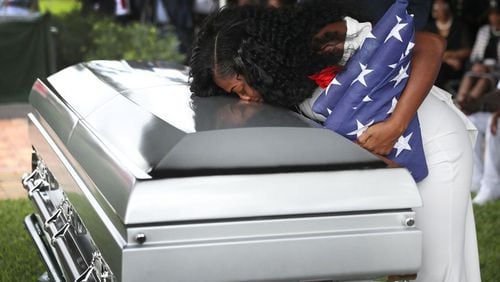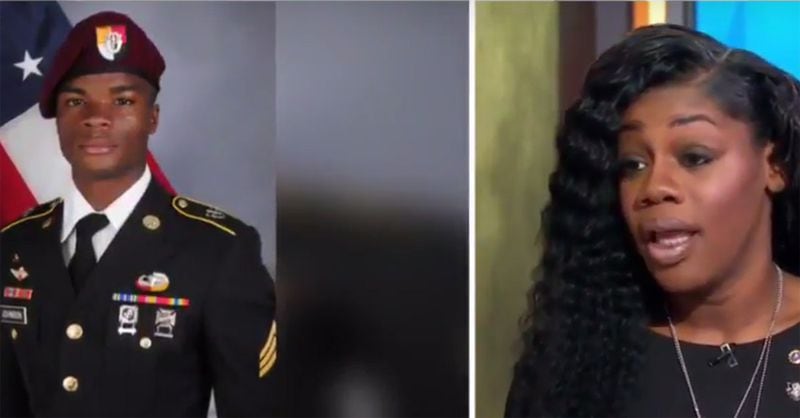A lot has been said this past week about President Donald Trump’s telephone call to the widow of La David Johnson, one of four service members killed earlier this month during an ambush in Niger.
What he said. What he didn’t say.
Listening to the back and forth, the critics and those who came to the president’s defense, I couldn’t help wondering what would’ve been the right thing to say. And who really knows what that is when you’re face-to-face or, as it were in the president’s case, on the phone with someone who’s lost a loved one?
As someone who lost both parents and two siblings before age 21, a child before I was 30 and two more siblings (including one who was murdered) before I turned 50, there are no words.
Hallmark comes close but trust me there are no words.
And so it reminded me of a previous column about why “you’re in my thoughts and prayers” seems to be the go-to refrain in moments like these.
That sentiment alone, whether heartfelt or not, would’ve been a good enough response for the president, but no, our commander in chief, Johnson’s widow, Myeshia Johnson, said, had this to say about her husband: “He knew what he was signing up for.”
It reminded me of a familiar Bible story in which Eliphaz, Zophar and Bildad show up to comfort their friend Job after he loses everything he owns, including his 10 children.
If you’re among those wondering what was wrong with what the president said and what would’ve been the proper response, Job’s conversation with his friends might hold the answer.
Scripture says that when Eliphaz, Zophar and Bildad lifted up their eyes at a distance and did not recognize Job (he was covered in boils), “they raised their voices and wept. And each of them tore his robe and they threw dust over their heads toward the sky.”
Right away, we know Job’s friends got three things right. First, they empathized with him. Second, they showed up. And third, they spent an entire week with him, commiserating with him in silence.
If only they had stopped there.
From Chapters 4 to 25, the friends launched into a series of speeches spewing accusations and inaccuracies about Job and why God allows suffering.
I don’t think any of us disagree that the president went a little too far, but none of us can really say what was in his heart any more than Job’s friends knew the reason tragedy visited him.
What’s clear in this story, however, is God’s condemnation of the advice Eliphaz, Zophar and Bildad had to offer. In Job 42:7, we find these words: “… the LORD said to Eliphaz the Temanite, My wrath is kindled against thee, and against thy two friends: for ye have not spoken of me the thing that is right, as my servant Job hath.”
Job’s response to his friends?
“God has delivered me to the ungodly and turned me over to the hands of the wicked” (Job 16:11).
In an interview on ABC’s “Good Morning America,” Myeshia Johnson said she was “upset and hurt” after Trump told her that her husband, Army Sgt. La David Johnson, “knew what he signed up for, but it hurts anyways.”
“It made me cry,” she said. “I was very angry at the tone of his voice, and how he said it.”
So what’s the takeaway?
Show up and offer your condolences, but don’t offer counsel when you don’t understand what people are going through. More often than not, doing so will only add to their pain.
If your goal is to bring comfort, first sympathize with those who are hurting. That means entering into their situation, peering into their world and their experiences through their eyes to somehow understand what they are going through.
Like Job’s friends, the president showed up, but for whatever reason, he couldn’t connect. He showed little compassion and no mercy.
People like that often have an inflated view of themselves. They don’t show mercy because they do not understand their own sin or God’s mercy toward them.
That’s what I really find sad about all this.
About the Author









